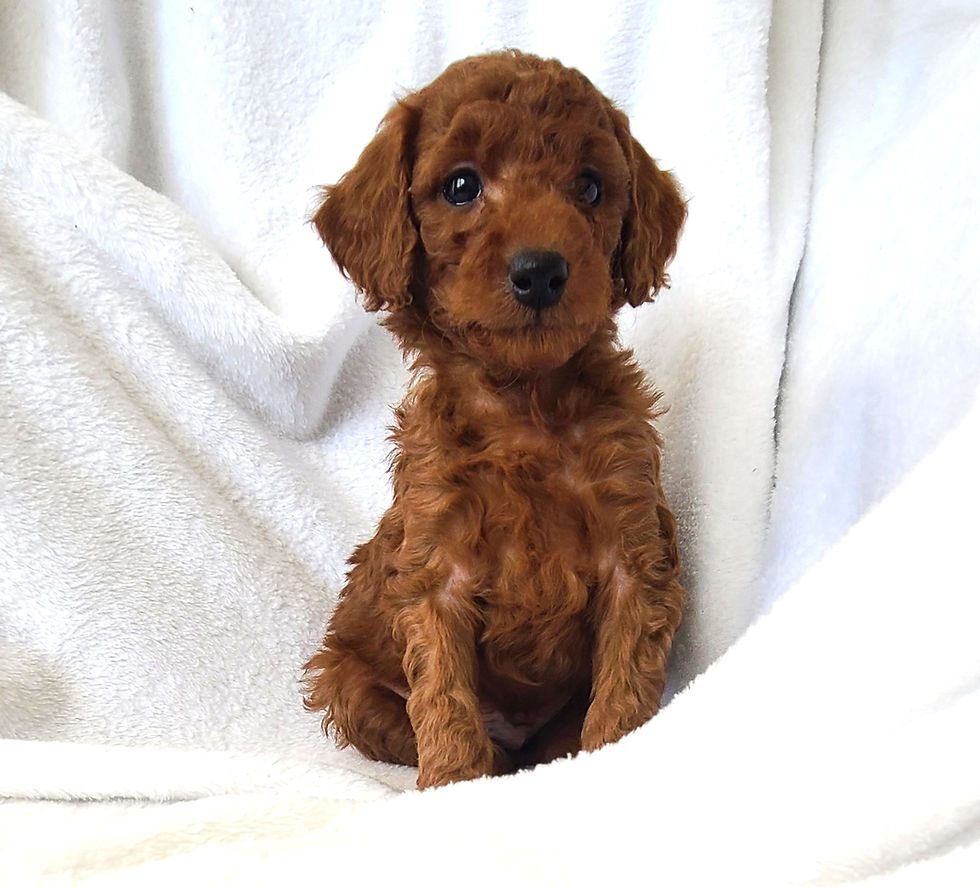Raising Happy & Healthy Mini Goldendoodles
- Julia Turik

- Jul 13
- 4 min read
Miniature Goldendoodles are a delightful mix of miniature poodles and golden retrievers. They are known for their intelligence, friendly disposition, and low-shedding coats, making them excellent companions for families and individuals alike. If you're considering welcoming a Miniature Goldendoodle into your home, you will want to ensure you're prepared to raise a happy and healthy pup. Here’s a guide to help you navigate this rewarding experience.
Understanding Miniature Goldendoodles
Miniature Goldendoodles inherit traits from both parent breeds, blending the poodle's intelligence and the golden retriever's friendly nature. This hybrid breed typically weighs between 15 to 35 pounds and stands about 13 to 20 inches tall at the shoulder. Their manageable size makes them ideal for various living situations, including apartments and houses with smaller yards.
Furthermore, these dogs come in a variety of colors, from cream to apricot to deep red. Their unique looks, combined with their loving temperament, make them a popular choice among dog lovers. Before you bring a Miniature Goldendoodle home, it is essential to research and understand their needs.

Essential Care for Miniature Goldendoodles
Providing the right care is crucial for your Miniature Goldendoodle's well-being. Here are some key aspects to consider:
Nutrition
Quality nutrition is the foundation of any dog's health. It's important to feed your Miniature Goldendoodle a balanced diet that meets its nutritional needs. Look for high-quality dog food formulated for small to medium breeds. Ingredients should include protein sources like chicken, lamb, or fish and whole grains for sustained energy.
Once your puppy is around six months old, consult with your veterinarian about appropriate portion sizes. Puppies may require more food to support their growth, while adults need a steady amount to maintain their ideal weight.
Grooming
Miniature Goldendoodles have a wavy to curly, low-shedding coat that requires regular grooming to prevent matting. Regular brushing at least a couple of times a week will help keep their fur smooth and free of tangles. Additionally, schedule regular baths every 4 to 6 weeks to maintain a healthy coat and skin.

Don't forget about other grooming essentials, like nail trimming, ear cleaning, and dental care. Taking your Miniature Goldendoodle to a professional groomer every few months can provide some extra help in managing their coat and overall hygiene.
Exercise Requirements
Despite their small size, Miniature Goldendoodles are energetic dogs that require daily exercise. Aim for at least 30 to 60 minutes of physical activity each day. This can include walks, playtime in the park, or games of fetch in the backyard. Engaging their minds is equally important, so consider incorporating puzzle toys or training exercises to keep them stimulated.
Regular exercise helps to maintain their weight and mental health, reducing the risk of behavior issues that can arise from boredom or excess energy.
Socialization and Training
Proper socialization is vital during your Miniature Goldendoodle's early months. Introduce them to different environments, people, and other pets to build their confidence and reduce anxiety. Exposing your puppy to new experiences will make them more adaptable as they grow.
Training is also essential for a well-behaved dog. Start with basic commands like sit, stay, and come. Positive reinforcement methods, such as treats and praise, work best with this breed due to their desire to please their owners. Look for ongoing training classes or puppy socialization groups in your area that focus on positive techniques.
Health Considerations for Miniature Goldendoodles
While Miniature Goldendoodles tend to be healthy dogs, they can be prone to certain conditions inherited from their parent breeds that are not found in DNA testing or OFA certifications. Regular veterinary check-ups can help detect any potential health concerns early on. Here are a few common issues to watch for:
Allergies
Poodles are known for their allergies, which can also affect Miniature Goldendoodles. Watch for signs like excessive scratching or ear infections, and speak with your veterinarian if you suspect allergies are a concern.
Cancer
Golden Retrievers are known to have one of the highest cancer rates among all dog breeds. Studies show up to 60% of Golden Retrievers may develop cancer, particularly hemagiosarcoma, lymphoma, mast cell tumors and osteosarcoma. Although we do all the testing available, there is not a gentic code or marker for cancer. Feeding a healthy diet, maintaining an ideal weight, and scheduling regular vet check-ups can help early detection and save lives. Watch for signs of illness like lumps, lethargy, unexplained weight loss, or pale gums.
Creating a Loving Home Environment
A loving and stable environment is critical for your Miniature Goldendoodle to thrive. Here are some practical steps to cultivate a positive atmosphere:
Consistency
Establish a routine for feeding, playtime, grooming, and bathroom breaks. Dogs thrive on structure, which helps them feel secure. Consistency in rules and commands will also help your pup understand what is expected of them.
Family Involvement
Involve all family members in caring for your new puppy. Sharing responsibilities—like feeding, walking, and training—helps solidify the bond between your Miniature Goldendoodle and the entire family.
Safe Space
Create a comfortable space for your Miniature Goldendoodle, equipped with cozy bedding and toys. This safe haven will provide your puppy with a personal area to retreat when feeling overwhelmed.
Final Thoughts on Raising Miniature Goldendoodles
Raising a Miniature Goldendoodle is a fulfilling journey filled with joy and companionship. With the right care, socialization, and training, you can foster a well-adjusted dog that will bring endless happiness to your life.



Comments